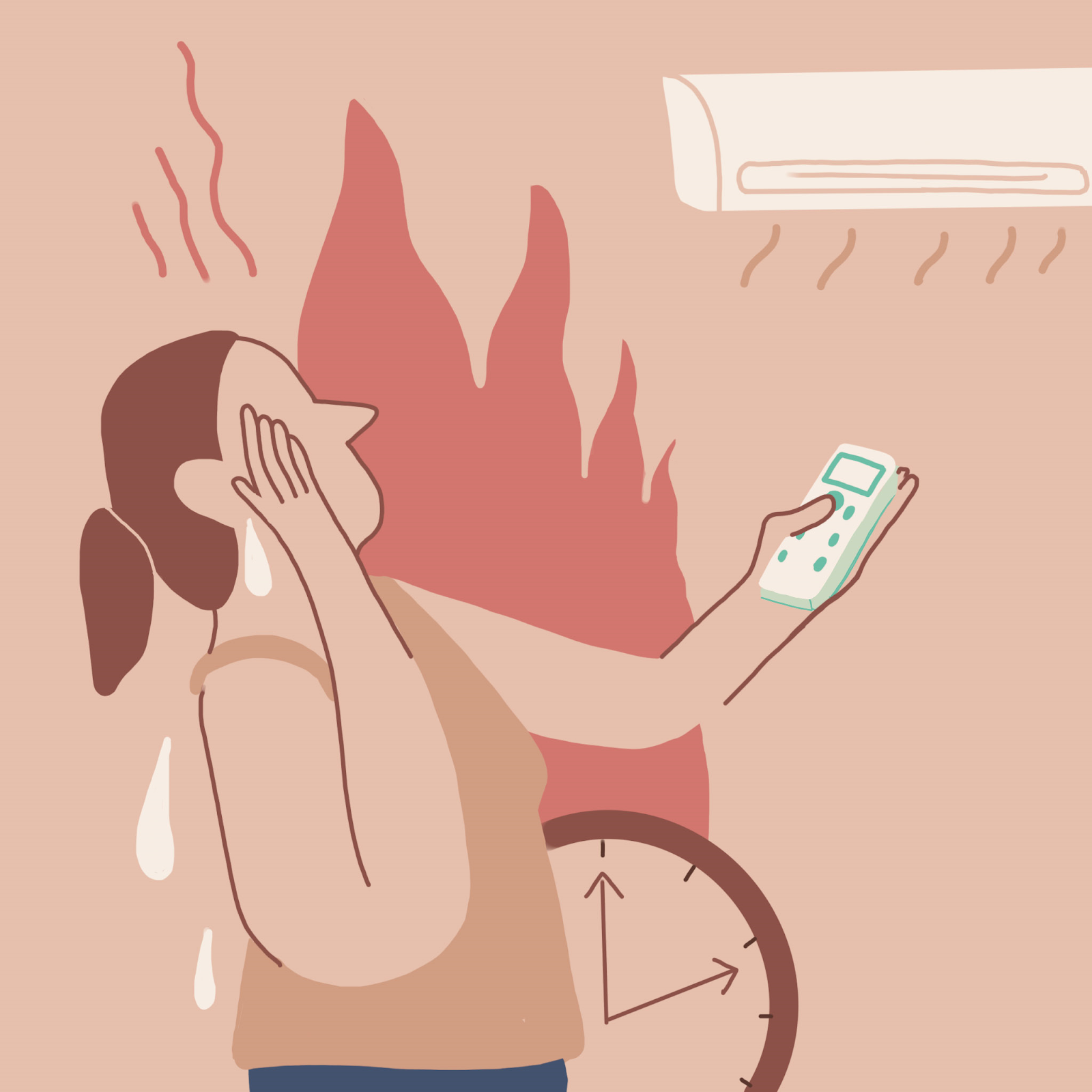This blog has been compiled by Vaibhavi Kodnani, a content writer for Proactive For Her.
The advent of menopause brings about many changes in a woman’s body. You may witness a multitude of symptoms due to the sudden hormonal decline in the body. Irregular periods, vaginal dryness, bloating, hot flashes, flushing, insomnia, and anxiety are just some of the signs of menopause.
Hot and cold flashes are one of the most common perimenopause symptoms, observed in more than 80% of menopausal women. For many women, hot flashes can be frequent and severe, thus impacting their daily lives in several ways. When hot flashes occur at night, they are called night sweats. Knowledge about the causes and triggers of hot flashes, quick relief methods, and therapies can be hugely beneficial for menopausal women.
Read on to learn about hot flashes in detail.
What is a hot flash?
A hot flash is the sudden feeling of warmth or heat in the upper body and face that is not caused by external sources.
You are likely to experience the following symptoms during a hot flash episode:
- Intense heat over the face, neck and chest
- Sudden reddening of the skin
- Flushing of the face
- Sweating, primarily on the upper body
- Increased heart rate
- A marginal increase in systolic blood pressure
- A feeling of chills in the body
This unexpected sensation can cause substantial discomfort and embarrassment, especially if it occurs in a public place or workplace. One may panic and feel anxious or irritable. Night sweats can cause a disturbed sleep pattern and thus increase anxiety.
How long does a hot flash last?
An episode of hot flash can last between 1-5 minutes. After about 10 minutes, your core body temperature will start declining due to sweating. However, it might take around 30 minutes for your skin temperature to return to normal.
How often can hot flashes occur?
Some women may experience it only once or twice a day. However, for some, the occurrence of hot flashes can be much more severe and range anywhere between 10-15 times per day.
Why does a hot flash happen?
Hot flashes are due to the fluctuating levels of hormones during the menopause transition, menopause, and postmenopause stages. Research suggests that the decreasing levels of estrogen make the thermostat of the body, i.e. the hypothalamus, more sensitive to mild changes in the body temperature. When the hypothalamus feels that the body is too warm, it starts a series of responses to cool the body, and restore normal body temperature. This process sometimes presents in the form of hot flashes.
Did you know?
Hypothalamus is a small part of the brain that is responsible for the regulation of our internal body temperature. It makes sure that our body temperature remains about 37°C which is generally considered normal.
Hot flash triggers
Certain factors can make women prone to hot flashes.
- Smoking or exposure to cigarette smoke
- Drinking alcohol
- High BMI: Overweight or obese women
- Sedentary lifestyle
How can hot flashes be prevented and managed?
Although you cannot avoid hot flashes, you can definitely take care of their intensity and frequency. There are some ways to make yourself at ease when you get a hot flash. You can also consider lifestyle changes, medication or natural treatments to manage hot flashes better.
Quick-relief methods for hot flashes
Even though a hot flash episode lasts for a few minutes, it can still be discomforting and cause an interruption in your daily activities. However, using these simple tips, one can achieve immediate relief :
- Cool the room - Keeping the temperature of the room relatively low can be helpful. You can open the windows of the room, increase the fan speed or switch on the air conditioner.
- Wear layered clothing - You can quickly adjust your clothing depending on how you are feeling.
- Drink cold beverages - Always keep ice water, cold juices or any other cold drinks handy. You can sip on it at the beginning of a hot flash.
Lifestyle changes
Certain lifestyle habits can aggravate hot flash symptoms. You can reduce the intensity of hot flashes through lifestyle modifications
- Avoid caffeinated beverages and alcohol
- Quit smoking
- Keep your weight in check - Reduce weight if you are overweight or obese
- Try relaxation techniques like yoga and meditation
- Exercise regularly
- Eat a well balanced and healthy diet
Hot flashes treatments
If the hot flashes are interfering with your daily activities and night sleep; you should consult your doctor. There are two types of medications available for hot flashes treatment - Hormonal and Non-Hormonal.
Hormone Replacement Therapy (HRT)
Since the root cause of menopausal symptoms is the sudden drop in hormones, Hormone Replacement Therapy can help in levelling them out. If you are experiencing severe symptoms, your doctor may suggest this treatment with synthetic hormones.
Estrogen is the primary hormone used in menopause treatment. Women who have undergone hysterectomy can take just estrogen supplements. But those who have an intact uterus need to take estrogen along with progesterone. You can consume it in the form of oral tablets, vaginal cream, gel or a patch. Bazedoxifene is an alternative hormone which can go along with estrogen instead of progesterone.
Non-hormonal Treatments
Bioidentical hormones are artificial hormones which have the same chemical and molecular structure as the hormones produced in the human body. Antidepressants like Paroxetine, Clonidine, Gabapentin have proven to be effective in the treatment of hot flashes.
Natural remedies for hot flashes
Some alternative and natural home remedies can help with symptoms but one must consult their doctor before taking any of these -
- Soy products
- Red clover
- Flaxseed or flaxseed oil
- Dong Quai - Chinese herbal medicine
- Black cohosh
The natural remedies listed above contain phytoestrogens. Thus, they may be beneficial in reducing the severity of hot flashes and other menopausal symptoms.
Did you know?
Phytoestrogens are plant-derived compounds that are very similar to the female sex hormone estrogen.
Bottom line
Hot flashes can interfere with daily activities and affect the quality of life. However, with the right lifestyle changes and treatments, one can effectively manage these menopause symptoms. Menopause is an inevitable part of womanhood; accepting this will help you deal with the symptoms better. Lastly, it is crucial to communicate with your loved ones, so that they can understand and support you better.
Disclaimer - This information is provided for educational purposes and should not be construed as medical advice. Please consult with your healthcare practitioners before undertaking any changes in your diet or adding supplements.
Proactive For Her is a digital clinic for women, offering accessible, personalized, and confidential health-care solutions. We offer products and services for out-patient health concerns of Indian women, across their lifetime - from puberty to pregnancy to menopause. To know more on the sexual and reproductive health of women, visit https://www.proactiveforher.com/

